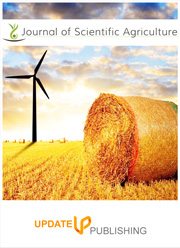Autohemotherapy: An effective treatment regimen for teat warts in cattle under Leh Ladakh conditions
DOI:
https://doi.org/10.25081/jsa.2025.v9.9349Keywords:
Teat wart, Cows, Autohemotherapy, Cold aridAbstract
Leh-Ladakh is a cold arid region of Jammu and Kashmir UT of India with an average altitude of 3500 meters. The climatic conditions are very harsh in terms of low rainfall, low humidity and temperature variation from -40 °C to +35 °C. Ladakh remains cut off from the rest of the world by road for most of winter months. Animal clinical camps were organized by Krishi Vigyan Kendra Leh in the Thiksey and Rambirpur villages of Leh. Four (4) animal clinical camps were organized in these villages. Eleven (11) cases of cows with teat warts were presented in these camps. Due to local customs, many farmers do not prefer the use of allopathic medicines, besides the paucity of medicines in most of villages; autohemotherapy was performed on these animals. 15- 20 mL of blood was removed at a time from these animals and then 10 mL of this blood was injected deep intramuscularly in the gluteal region and 5-10 mL of blood was given subcutaneously in the lateral neck region. The practice was followed once a week for four weeks. Nine out of eleven cows responded well to the treatment. The teat warts began to regress from the third week and most of the warts either degenerated or fell off from the animal by six to eight weeks.
Downloads
References
Apaydin, A. M., Aydin, M., Ciftci, O., Timurkaan, N., Yildiz, H., & Tonbak, S. (2010). Effects of Paronychia kurdica on teat and udder papillomatosis in cows. Revue de Médecine Vétérinaire, 161(6), 267-271.
Börkü, M. K., Atalay, O., Kibar, M., Cam, Y., & Atasever, A. (2007). Ivermectin is an effective treatment for bovine cutaneous papillomatosis. Research in Veterinary Science, 83(3), 360-363. https://doi.org/10.1016/j.rvsc.2007.01.016
Chetan Kumar, G. K. (2011). Recent Developments in diagnostics and therapeutics including applications of nanotechnology in veterinary medicine. Proceedings of 29th ISVM Convention & National Symposium.
Ganesh, H. (2011). Cutaneous papillomatosis in a non-descript cow. Veterinary Science Research Journal, 2(1 & 2), 37-38.
Manoj, K., & Pant, S. S. (2017). Herbal Therapy: An Alternative against Bovine Teat Papillomatosis in Cattle. International Journal of Current Microbiology and Applied Sciences, 6(2), 1194-1196. https://doi.org/10.20546/ijcmas.2017.602.135
Mathi, P. M., Saranya, K., Umadevi, U., & Umakantha, T. (2016). An Effective Treatment Regimen for Warts in Cattle. Journal of Veterinary Science and Animal Husbandry, 4(2), 202. https://doi.org/10.15744/2348-9790.4.202
Nehru, P. A., Sunandhadevi, S., Rama, T., & Muniyappan, N. (2017). Efficacy of auto-hemotherapy in bovine teat papillomatosis: A case report. Advances in Animal and Veterinary Sciences, 5(8), 350-351.
Paksoy, Z., Gülesci, N., Kandemir, F. M., & Dinçel, G. Ç. (2015). Effectiveness of levamisole and tarantula cubensis extract in the treatment of teat Papillomatosis of cows. Indian Journal of Animal Research, 49(5), 704-708.
Tokura, K., & Kagawa, S. (1995). Anti cancer agent containing chebulanin from Terminalia Chebula. Japanese Kokai Tokkyo Koho, 07, 138-165.
Published
How to Cite
Issue
Section
Copyright (c) 2025 Nazir Ahmad Mir, Shahid Ahmad Shergojry, Ishtiyak Ahmad Mir, Sarver Ahmad Rather

This work is licensed under a Creative Commons Attribution-NonCommercial-NoDerivatives 4.0 International License.



 .
.